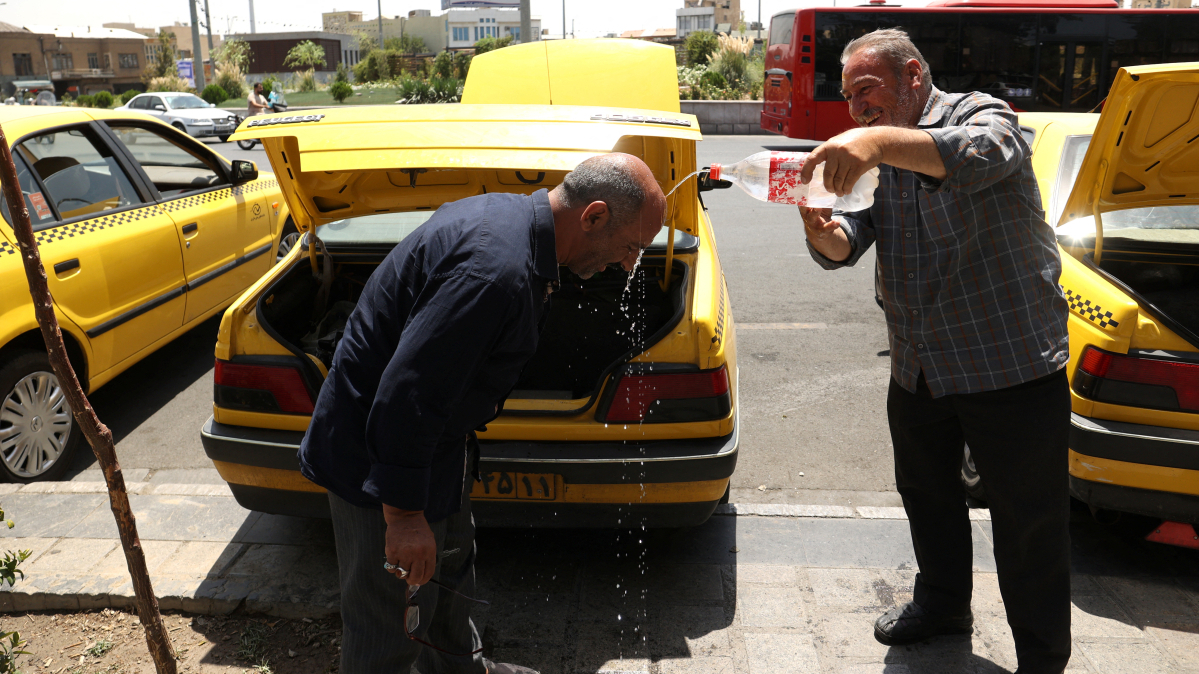U.S. deploys carrier near Israel; countries urge citizens to leave region
The United States has deployed the aircraft carrier USS Gerald R. Ford near Israel as part of a growing military build-up amid tensions with Iran, whi...

Iranian President Masoud Pezeshkian has urged the public to drastically reduce water consumption in the aftermath of an unprecedented drought across the country.
At the same time, the Ministry of Energy has announced plans for cutting Tehran's water supply at night as water shortage intensifies.
Speaking at a conference in Kurdistan Province, Pezeshkian warned that if the critical water shortage continues, it would be rationed in Tehran for the next few weeks, adding that it could lead to possible evacuation of the capital if the situation does not improve in coming months.
“If it does not rain in Tehran by December, we will have to ration water; if it does not rain again, we will have to evacuate Tehran,” the president said.
He also said that water shortage is a national issue and called for long-term plans to invest in wastewater recycling and desalination.
With an exception of its northern provinces bordering the Caspian Sea, Iran’s predominantly dry geography has contributed to the depletion of water reserves. Climate change and global rising temperatures are adding to its water problem.
After President Pezeshkian’s warning last week of worsening shortage across the country, the government has started “adjusting” the capital’s water distribution at night in sections of Tehran’s districts lasting for 5 hours since midnight.
Ministry of Energy on Monday rejected the nightly water supply shut off in Tehran saying it had no option but to lower the supply pressure to economize its usage.
"Despite entering the sixth consecutive year of drought, there are no plans to cut off or ration water, and our main policy is to manage the network by adjusting pressure during the night hours," said CEO of the Tehran Provincial Water and Wastewater Company Mohsen Ardakani.
The decision aims at preserving the declining reserves while the Iranian capital of estimated 10 million population is facing its severest water shortage in decades.
According to official figures, water levels in Tehran’s reservoirs have dropped by 40 percent since last year mainly because of the reduction in rainfall as well as the hike in demand due to the enlargement of the capital and its satellite towns which reportedly use 1 billion liters of water per day.
Ministry of Energy said that essential pubic services including hospitals will be exempt from the water shut off while Tehran’s water distribution system is experiencing an unprecedented stress of the last 60 years.
It has also launched water saving campaign educating the public to fix leaks and stop watering gardens to reduce usage for at least two months.
The death toll from heavy rains and flooding in Brazil’s Minas Gerais state has risen to 46, authorities said, with 21 people still reported missing. The storms triggered landslides and widespread flooding, displacing thousands across Juiz de Fora and Uba.
The situation in Cuba was heating up and called for restraint following a deadly incident involving a Florida-registered speedboat off the coast of the Caribbean island, the Kremlin said on Thursday (26 February).
Syria’s economy is showing clear signs of recovery, with economic activity accelerating in recent months, the International Monetary Fund (IMF) said on Wednesday.
The United States has deployed the aircraft carrier USS Gerald R. Ford near Israel as part of a growing military build-up amid tensions with Iran, while governments around the world urge their citizens to leave parts of the region.
Venezuela’s Attorney General Tarek William Saab and Ombudsman Alfredo Ruiz tendered their resignations to the National Assembly on Wednesday. Neither official has publicly provided reasons for stepping down.
Iran’s Foreign Minister Abbas Araghchi on Friday urged Afghanistan and Pakistan to resolve their differences through dialogue, offering Tehran’s assistance to facilitate understanding between its eastern neighbours.
Pakistan’s Defence Minister Khawaja Muhammad Asif said on Friday that the country was in an “open war” with neighbouring Afghanistan, declaring that Islamabad’s “cup of patience has overflowed” after overnight clashes in which both sides reported heavy losses.
Ankara has rejected media reports claiming it plans to deploy military forces into Iranian territory in the event of a U.S. attack on the Islamic republic.
Georgia’s path towards European Union membership is facing its most serious crisis to date, with senior European lawmakers warning that the country is now a “candidate in name only” and accusing the ruling government of reversing democratic progress and drifting away from Europe.
As Iran and the United States continue with nuclear talks in Geneva on Thursday, Tehran’s extensive ballistic missile programme remains a central point of contention.
You can download the AnewZ application from Play Store and the App Store.

What is your opinion on this topic?
Leave the first comment